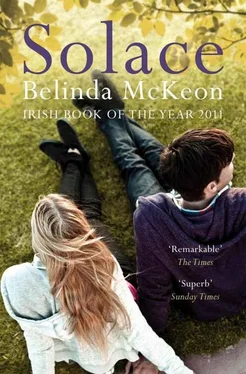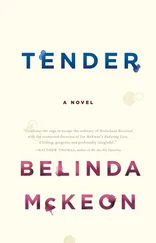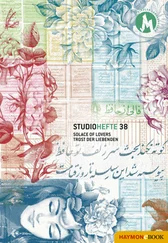They passed the disused travel agent’s, and the hair salon already busy with women sitting under driers, and the four squat cottages at the foot of the hill. He felt the pushchair jolting, and he knew that Aoife was pointing to something, kicking her feet, saying one of her words. It was impossible to hear her. At this hour, these streets were at their worst; hardly wider than country lanes, bloated with rush-hour traffic. From narrow junctions all along Manor Street, drivers tried to edge into the main flow, surging forward, stalling, ignoring the horn blasts. Ahead of Mark on Arbour Hill, a lone cyclist was forced in tight to the kerb by traffic, one foot on a pedal and the other stepping its way along the pavement. A siren dipped into the clamour of horns and engines and car radios. The bells from the nearby church rang for nine, and an instant later, the jingle for the hourly news sounded from inside the car that Mark was passing. The driver pounded both hands on the wheel and swore. Ahead, several sets of lights changed to red at the same instant. So imperceptible had the crawl of the traffic been that it was only in its sudden seizing up that it made itself known. Mark walked on.
People were still sleeping on benches in the park. It was too early to expect them to be up and moving in towards the city. An old man lay on a bench, a piece of clothing bundled up as a pillow, his feet on the armrest as though he were basking in the sun. Farther on, a couple lay locked together under a blackened blanket, cider cans on the ground beneath the bench, like skittles toppled in a game. Sometimes, especially during the winter, passers-by would leave things under the benches: packets of crisps, or sandwiches, or cartons of milk. There were no offerings today. After he had passed, Mark reached into his pocket, thinking to leave them some coins, but he found nothing that could be of use — a clothes-peg, a penny, a soother. He moved on towards the pond.
He settled the pushchair at a bench in front of the spot where the ducks seemed busiest; they were surfacing, circling, fussing. Aoife was straining against the straps, calling out. It was her new word, her fourth word. Up. He unstrapped her and lifted her out as she squirmed. She started, in her hurried, half-balanced steps, towards the water, towards three fat ducks, which were ignoring her, picking at themselves with their beaks. She squealed, and still they ignored her, and she turned to look back at Mark, and to wave her arms at him, and to smile a smile of such unbuttressed glee that he found himself feeling, for an instant, almost sorry for her. They’re ducks, he found himself wanting to say to her; dirty, probably diseased ducks, and they’re ignoring us, and if you go closer they’ll scatter and get as far away from you as possible, and yet, from the look on your face, they’re the best thing in your life right now. In your little life.
The ducks moved off into the middle of the pond. Aoife watched them and turned to him with a question on her face. He knew what it was.
‘Ducks gone,’ he said, in the tone he used to tell her that something — a yoghurt, a drink, a game — was finished. Her reaction to this tone was the same as always. She shook her head. She peered at him as though giving him one more chance to change his tune. She swung an arm towards the ground as though throwing something. The action unsteadied her. She jolted on her feet.
‘Ducks gone,’ he said again, and she began to whine. A low whine at first, a warning — there was still time to repent, it seemed to say, there was still time to get the ducks back, to set everything right with the world — but as he came towards her it rose to a wail, and as he bent to her she was howling, flailing, battling against him. Her cries spread out over the water of the pond, and the ducks lifted too, into clumsy, irritated flight, and he rocked her, and shushed her, and bundled her into the pushchair. Already the park was growing busier — other pushchairs, other parents, other howls about other heartbreaks, other eyes lighting up at the sight of other indifferent birds. On the bench where they had been sleeping, the man and woman were awake now, sitting at a distance from each other. Their hands, wrapped around new cans of cider, were the same deep red as their faces, their coats looking too heavy for the warm day it was turning out to be. They could have been in their thirties or their fifties; it was impossible to tell. Both of them had eyes of an intense, bright blue. But they did not look at him. They looked elsewhere. She to the ground. He to the sky.
*
Later, as Mark sat in front of the television, Sarah phoned to ask him to come to dinner with her and Deirdre in their house in Phibsborough the following evening.
‘Tomorrow?’
‘Yes, tomorrow. You don’t have anything else on, do you?’
‘Not that I know of.’
‘And how’s Aoife?’
‘She’s asleep upstairs. Finally.’
‘The little pet. You can bring her, needless to say.’
‘That’s all right. Eileen will watch her.’
‘Aw,’ Sarah said.
‘You wouldn’t say that if you were here with her all day.’ He smiled as he spoke, but he could hear that she was not smiling; he could hear her suck her breath in suddenly, and he knew an apology was tumbling his way.
‘Oh, of course, of course, of course you need your time to yourself. Don’t mind me. Sure we’ll see lots of Aoife. We’ll all have a day out or something soon.’
‘What should I bring? To dinner.’
‘Just yourself.’
‘No. Come on. I’ll bring wine, obviously. But do you want me to bring dessert?’
‘Bring wine, then,’ Sarah said. ‘But there’s really no need. We have plenty.’
*
Eileen worked in the space where the shelves and counters of a grocery store had once been. Fabrics were piled high on chairs, and rails held trousers and dresses and skirts waiting to be altered. Aoife reached for a small plastic lunchbox full of coloured thread and emptied it on the floor, sitting down heavily among the spools to grab at them and arrange them around herself in some unknowable order. Mark apologized for the mess, but Eileen shook her head.
‘She’s doing no harm,’ she said. ‘She’ll be fine here for the evening, and don’t you worry your head about her at all.’
Aoife did not react to his leaving, at least not that he could hear as he walked down the street. The evening was still warm, the brick of the terraces glowing a rich, baked red. Something flashed through his mind: red brick burnished on the street outside Kehoe’s that July evening the year before, but then a taxi was passing, and he was hailing it, and there was need to think of other things, the address for Sarah and Deirdre’s house, the speed with which the driver pulled away, the fact that he had forgotten, after all, to buy a bottle of wine.
The driver, thin and sickly and wearing a thick gold chain, asked him questions about his job and his holidays and how long he thought the good weather was likely to last. ‘Christ knows we deserve some kind of fucking summer,’ he said.
‘We do,’ Mark said, and for the rest of the drive they were silent. When they got to Phibsborough, Mark directed him through the narrow streets, and when the driver pulled up outside the house Sarah, in a blue summer dress, was at the front door, waving. She hugged him tight in greeting.
‘I’m so glad you’re here,’ she said, and from the tone of her voice he knew it was going to be a long night. She was already close to tears.
He considered, for a moment, asking her to pretend that everything was normal, but he knew this was something he could not do. He pulled himself out of her embrace as gently as he could and smiled. ‘I forgot the bloody wine,’ he said.
Читать дальше












